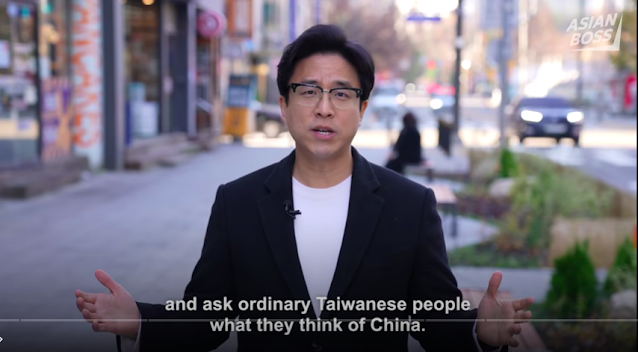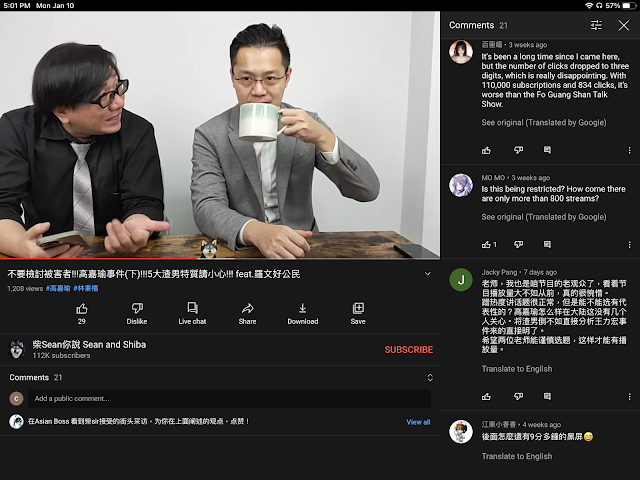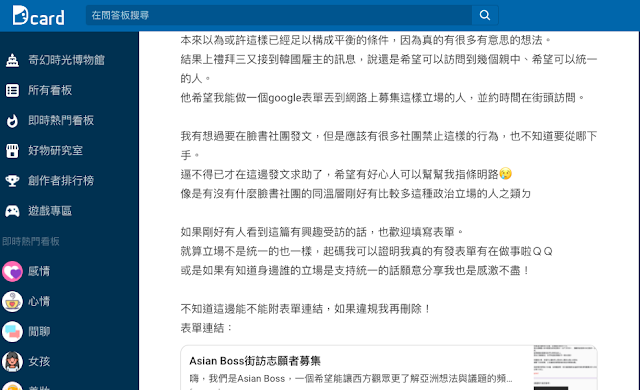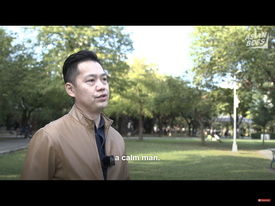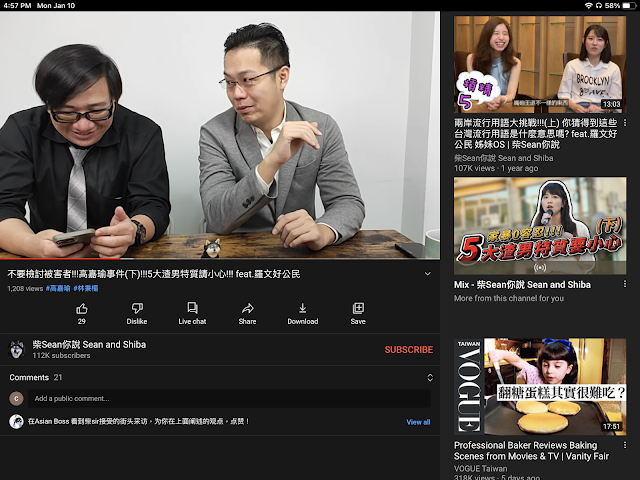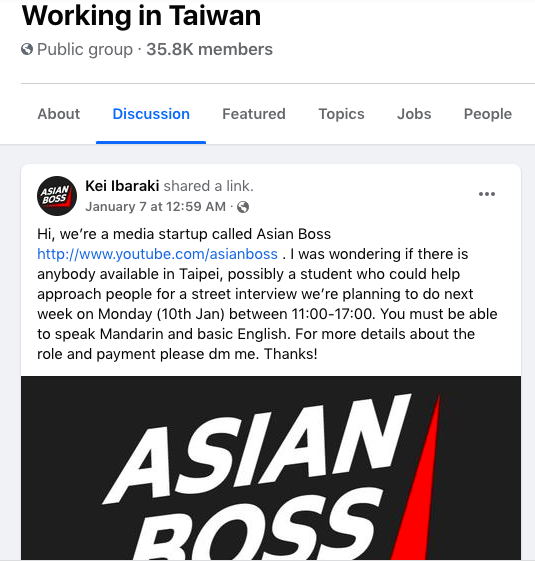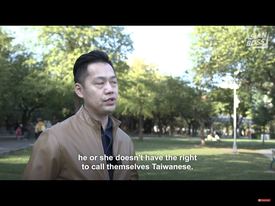Looks scary but ultimately it's just two guys in a lion costume
"My daughter was going to go to the US, but her flight was canceled due to the Canada fires. And also she thinks it's dangerous because of the 'zero dollar shopping' in the news," a friend said recently.
"What on earth is 'zero dollar shopping'?" I asked.
"You haven't heard of it? It's a big problem in California," she said. "It's in the news!"
She cited United Daily News (聯合報), a Taiwanese newspaper that's staunchly pan-blue but generally seen as reputable. There is indeed such an article, starting with discussion of 'zero dollar shopping' (零元購) and then launching into several subsections criticizing various, mostly liberal, policy initiatives in California, blaming them for what they imply is the disastrous situation of the state.
Let's take a look at what "zero dollar shopping" is, dive a bit into the UDN article, and then widen our scope to figure out where UDN got the idea that this is a crisis gripping California and the US as a whole.
"Zero dollar shopping" is essentially organized pickpocketing, looting or theft. I couldn't find a single thing using that term in US media, but that seems be a translation issue: 零元購 or "zero dollar shopping" is a Mandarin slang term in China -- I'm less sure about Taiwan -- for what is essentially organized theft. The closest English translation I could find was "flash robs": there are several references to these at the bottom of the Wikipedia entry for this term, and many of them seem to be from reputable news sources.
The UDN article reads as serious policy analysis, though it takes the tone of an editorial. It primarily blames California's Proposition 47 for the uptick in "zero dollar shopping". Proposition 47 passed in 2014 and reduces certain non-violent crimes from felonies to misdemeanors in an attempt to reduce prison overcrowding. UDN dismisses it as an obviously ridiculous policy choice (again with no input from experts) and calls Black Lives Matter "radical". It calls this and other mostly-liberal policies 'crude' or 'shortcuts' without any sort of input from experts. It's presented as news but is quite literally just, like, their opinion, man.
There was no citation or reference whatsoever in the first part of the article about "zero dollar shopping", though plenty of links were offered to the Wikipedia sites of the various stores mentioned. The best reference UDN offers is a screen grab of an American TV news report from NewsNation's Morning in America. I watch a lot of infotainment "morning shows" in the US because I spend a lot of my time there severely jetlagged and awake at weirdly early hours. I've never heard of Morning in America, but NewsNation claims to be centrist despite concerns that it actually leans to the right.
Links in later sections of the article include citing a rabidly anti-union website -- not exactly a great source of real news -- and exactly one link that's worth reading: The Georgetown Journal on Poverty Law and Policy. They use this link to claim the media has viciously criticized Proposition 47, but the article itself makes the strong case that this criticism is misguided:
Despite the public narrative that Prop. 47 is increasing crime rates, the evidence indicates that this is false. California’s statewide violent and property crime rates are lower now than they were in 2010, even before Plata. While there has been an increase in rates of certain crimes such as aggravated assault, robbery, and auto theft, Prop. 47 did not reclassify or attempt to influence any of these crimes. Furthermore, crime rates in other cities including San Jose, Oakland, Richmond, and Fairfield have decreased or remained stable. These contradictory outcomes suggest that Prop. 47 is not the cause of Los Angeles’ uptick in aggravated assault, robbery, and auto theft.
It also cites The Washington Post as criticizing Proposition 47. This is a real article from 2015, but it's not linked. It cites an increase in various nonviolent crimes in California, but admits that the link to Prop 47 is unknown and unclear (the Georgetown article above points out that crime rates in California are actually lower than in 2010, which both the writer and UDN would have realized if they'd actually read the article they linked).
That's all fairly typical in Taiwanese media -- after all, a free press is a precondition for quality journalism, but doesn't guarantee it -- but it gets slightly weirder.
My friend also said she saw a blurb from UDN discussing "zero dollar shopping" that cited The Washington Post. It's not hard to find this -- here's a screenshot:
The Washington Post story and most of the "organized theft" articles from the "flash rob" Wikipedia page are from the 2010s; only one is from 2022. It points out that crime is actually on the downswing if you go back just a few years:
Robberies in 2021 are up 3.2% in Los Angeles compared with 2020, but are 14.1% lower than in 2019. In and around Union Square in San Francisco, robberies fell nearly 5% from 2020 to 2021, while burglaries fell 2.3%.
It's not rare for conservative media in the US -- which to me is most media -- to confuse correlation with causation and fearmonger incessantly about even the most benign attempts at compassionate systemic reform. This is swirled around by tabloid rags like the New York Post, which more recently brought up Prop 47 in relation to a story about a San Francisco Target "locking down" its merchandise.
Other recent coverage is more along the lines of the Georgetown journal piece and the LA Times article. Even CNN doesn't buy that "flash robs" are a serious issue because, again, the data simply don't support it.
If the US media is at best divided on the issue -- and in more recent years, inclined to think it's a non-issue -- where did UDN contributor Liao Chi-hung (廖啟宏) get the idea that it's somehow a serious issue crippling California and the US as a whole? From his professional background, I'd think Liao should know better.
It concerns me, because Liao's piece reads like expert analysis, when it's mostly garbage that either lacks meaningful citation, or deliberately misrepresents the content of its references. Yet it was enough to convince my friend and her daughter that there was indeed a massive "organized theft" based crime wave ripping across the US, endangering passerby, and that this was also reported as fact in the US media. I doubt she actually checked the links in the article, and I don't blame her; if I were a non-native speaker I probably wouldn't, either.
There may not be much meaningful support for Liao's position in reputable media, but there's plenty in the disreputable bowels of the Internet!
At least one of these articles predates UDN's platforming of Liao's absolutely ridiculous opinion, and there are lots of Tiktoks under the hashtag #零元購, and a few Youtube videos. Here's one example, and here's an eye-rolling propaganda piece by some random foreigner in English, put out by CTI (中天). A Yahoo! news article cites the LA Times (which, again, has pointed out that robberies are falling in the long term, not rising). Of course I was mostly going to bring up posts by the Mandarin-speaking online world, as I couldn't find much that was useful searching for "zero dollar shopping" in English.
This shouldn't have been enough to get Dr. Liao's knickers in a twist about a California legal policy that has no proven connection to crime rates which are, from a longer-term perspective, going down. Maybe he's just a credible guy with a preposterous set of opinions. It happens (see: Chen Weiss, Jessica).
About ten days after that, give or take, veteran reporter Fan Chi-fei (范琪婓) put out a Youtube video treating the idea of "zero dollar shopping" like a fact of life in the US. The video blurb alone makes the country seem like a lawless scene of hell and disorder. The US isn't great, but it's not quite that. Fan had previously worked for both deep blue TVBS and blue-red CTI (中天), which notably got caught in enough lies that their TV license was revoked (the ruling has since been overturned). However, she's also worked for pan-green Sanli 三立. Fan doesn't seem like a typical unificationist or anti-US mouthpiece, so I doubt she intentionally spread what is, at its core, a bogus story.
Then, in the past few days, frightfully dodgy websites full of extremely dodgy English have been pissing out laughably dodgy content, so that a search for "zero dollar shopping" in English produces plenty of hits. Any native speaker or mastery-level speaker of English as a second language would immediately see these for what they are: an array of utter trash.
Again, however, this was enough to convince a highly intelligent person and proficient English speaker that the US was a dangerous place due to this "zero dollar shopping". It looks like a joke to me, but it wouldn't necessarily to someone else.
It's obvious why US conservatives would push this false narrative: attack a blue state, especially one that's seen as an attractive place to live for many. Make Democrats and their liberal policies look bad. Drum up the base. Get people scared and angry about the Other, in this case the fear of violent criminals and by extension, the poor. Tale as old as time.
Why would Chinese-language media do this, though? Perhaps their crappy websites and baseless Tiktoks are meant to cause not just other Chinese people, but Taiwanese as well, to feel that the US is a terrifying, lawless society. Who would want a poorly-governed superpower as a friend and ally? In fact, who would want to visit it? The US touts itself as a freedom-loving democracy -- is this what happens when you are "too democratic"? Perhaps we should aim to be a little less "free", a little more like, oh, say, safe and happy China?
(I don't actually think the US is "too democratic"; if anything it's not democratic enough. But I hope some of you remember this oft-repeated line in Taiwanese media during the Ma Ying-jeou years. "Democracy is good but Taiwan is too democratic!" Barf.)
This is indeed what I think is happening, as the English on these websites isn't good enough to convince anyone except middling-proficiency users, and perhaps not even then. Therefore, the show is probably not for us. Added together, they sure look like a preponderance of news in English, though!
Besides, I've noticed some of these "zero dollar shopping" links are said to be videos from other democratic countries like Korea and Japan (here's one tweet by a pro-China account with a not-insignificant number of followers, but there are a handful of others if you look). It's almost as if they're trying to make every democratic nation that Taiwan has friendly relations with look like a lawless hellhole, when they're not.
I can't prove they're taking Liao and Fan's silly idea that organized theft is causing the destabilization of American society and targeting it at Taiwanese, or Chinese, or others around the world. Besides, it's hard to even prove that these dodgy sites are deliberately engaging in fake news, buttressed by credible professionals. After all, the best fake news has a kernel of truth to it. A handful of US opinionators. A few true-ish statistics. A New York Post article. The fact that a small number of "flash robs" have, indeed, occurred.
But it sure looks like it's deliberately fake, there are Taiwanese people who believe it, and people like Liao Chi-hung, Fan Chi-fei and UDN should know better.









